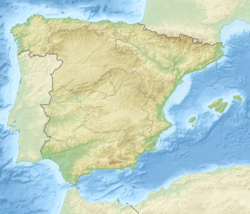Uclés is a municipality of Spain located in the province of Cuenca, Castilla–La Mancha.[2] The municipality spans across a total area of 64.61 km2 and, as of 1 January 2020, it has a registered population of 212.[2]
Uclés | |
|---|---|
 View of Uclés | |
| Coordinates: 39°58′50″N 2°51′46″W / 39.98056°N 2.86278°W | |
| Country | Spain |
| Autonomous community | Castilla–La Mancha |
| Province | Cuenca |
| Area | |
| • Total | 64.61 km2 (24.95 sq mi) |
| Population (2018)[1] | |
| • Total | 140 |
| • Density | 2.2/km2 (5.6/sq mi) |
| Time zone | UTC+1 (CET) |
| • Summer (DST) | UTC+2 (CEST) |
History
editThe fortress and town was probably built by al-Fath ibn Musa ben Zennun circa the late 9th to early 10th century, becoming the al-Fath's main stronghold after his father's death in 908.[3] Having submitted to the Cordobese central authority by the 920s,[4] the rebellious Banu Zennun (later arabised to 'Dhi-l Nun') clan was removed from the place by 936, although Uclés returned to their control in 1018.[3]
The place passed to Christian control in the wake of the conquest of the Taifa of Toledo in 1085 and then was lost a year after following the Battle of Sagrajas.[5] The Almoravid rule consolidated after the 1108 Battle of Uclés.[5]
Towards 1157, the fortress of Uclés was acquired in a barter by Alfonso VII from Ibn Mardanix in exchange for the fortress of Alicún.[6] The fortress was ceded to the Order of Saint John of Jerusalem in 1163,[7] and, following the unsuccessful repopulating efforts by the Knights Hospitallers,[7] to the Order of Santiago on 9 January 1174.[8] The Order's grip in the area consolidated following the 1177 takeover of Cuenca and Uclés was granted a fuero by the order's Grand Master in 1179, henceforth becoming the seat of an encomienda and the headquarters of the order in the Kingdom of Castile.[9]
See also
editReferences
edit- Citations
- ^ Municipal Register of Spain 2018. National Statistics Institute.
- ^ a b "Datos del Registro de Entidades Locales". Ministerio de Asuntos Económicos y Transformación Digital. Retrieved 11 July 2021.
- ^ a b Almonacid Clavería 1988, p. 9.
- ^ Pretel Marín 1986, pp. 40–41.
- ^ a b Calzado Sobrino 2015, p. 77.
- ^ Pretel Marín 1986, p. 66.
- ^ a b Pretel Marín 1986, p. 67.
- ^ Ayala Martínez 1995, p. 26.
- ^ Ruiz Gómez 2006, pp. 123–124.
- Bibliography
- Almonacid Clavería, José Antonio (1988). "La kura de Santaveria: estructura político-administrativa". I Congreso de Historia de Castilla-La Mancha. Musulmanes y Cristianos: La implantación del feudalismo. Vol. V. Toledo: Servicio de Publicaciones de la Junta de Comunidades de Castilla-La Mancha. pp. 5–20. ISBN 84-7788-005-0.
- Ayala Martínez, Carlos de (1995). "Fortalezas y creación de espacio político: la Orden de Santiago y el territorio conquense (siglos XII-XIII)" (PDF). Meridies: Estudios de Historia y Patrimonio de la Edad Media (2). Universidad de Córdoba: 23–47. ISSN 1137-6015.
- Calzado Sobrino, María del (2015). "Documentación de la Orden militar de Santiago durante la conquista cristiana: el fondo documental de Uclés en la Edad Media" (PDF). Revista de Estudios del Campo de Montiel 1213 (1): 75–87. ISSN 1989-595X.
- Pretel Marín, Aurelio (1986). Conquista y primeros intentos de repoblación del territorio albacetense (del período islámico a la crisis del siglo XIII). Albacete: Instituto de Estudios Albacetenses.
- Ruiz Gómez, Francisco (2006). "La Mancha en el siglo XII: sociedades, espacios, culturas". Studia Historica. Historia Medieval. 24. Salamanca: Ediciones Universidad de Salamanca. ISSN 0213-2060.


